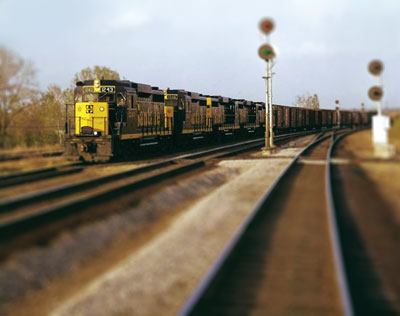The ongoing rise in fuel prices has prompted many industry retailers to find different ways of shipping certain items.
One popular solution is intermodal transportation, which utilizes railroad in concert with trucks to haul products from manufacturer to dealer.
“Without a doubt, it’s one of the best things we did in the last three years that saved us money,” said Jeff Bailey, vice president of operations at Spring Dance Hot Tubs in Jamison, Pa. “If I had known better, I would have done it years earlier. We’re talking about bottom-line savings.”
The average cost of a gallon of diesel fuel has stood well above $4 this year — up from $2.99 in 2010, according to the U.S. Energy Information Administration.
Meanwhile, Spring Dance receives 30 to 40 truckloads of hot tubs annually, Bailey said, and about three years ago the firm was trying to find ways to trim expenses. So his hot tub manufacturer’s rep turned him on to intermodal transportation, where his tubs would travel by rail from California to Pennsylvania, then arrive at his store by truck.
Bailey instantly saw savings of $700 to $900 per truckload, he said, adding that now he is also better able to track his orders through e-mail exchanges with his shipping company. They also notify him of the time of delivery three or four days in advance, he said.
But while it has brought savings, proponents do note that intermodal generally takes at least two days longer to ship goods than standard trucking. And if products are only traveling short distances — say, a state or two — the fuel savings may not justify switching to train.
In addition, because the retailer is essentially leasing entire shipping containers, it makes better financial sense for larger orders (15 to 18 spas, for example), said Blair Lynch, director of operations at Mermaid Pool, Spa & Patio in Anderson, Ind.
“We don’t always have the luxury of ordering a truckload at a time,” he added, “so we usually split it with another dealer that’s relatively close by. But timing is something you have to pay attention to.”
Management at WCI Pools & Spas in Ames, Iowa, began using intermodal about three years ago. On their last shipment, which consisted of eight hot tubs, the company saved approximately $800, said co-owner Chad Higgins.
Because the cost of delivery is fixed for at least six months at a time, he said, forecasting also becomes easier.
Furthermore, it has helped him avoid incidents such as the one that happened in 2010, when a load of spas got held up in Colorado for nearly a week after the engine blew out on his delivery firm’s truck.
“We’ve had fewer issues like that,” he said. “It’s really just a matter of economies of scale: You have to find a tipping point to where it makes sense. But whenever we have a sizable order coming up, it usually makes sense.”




